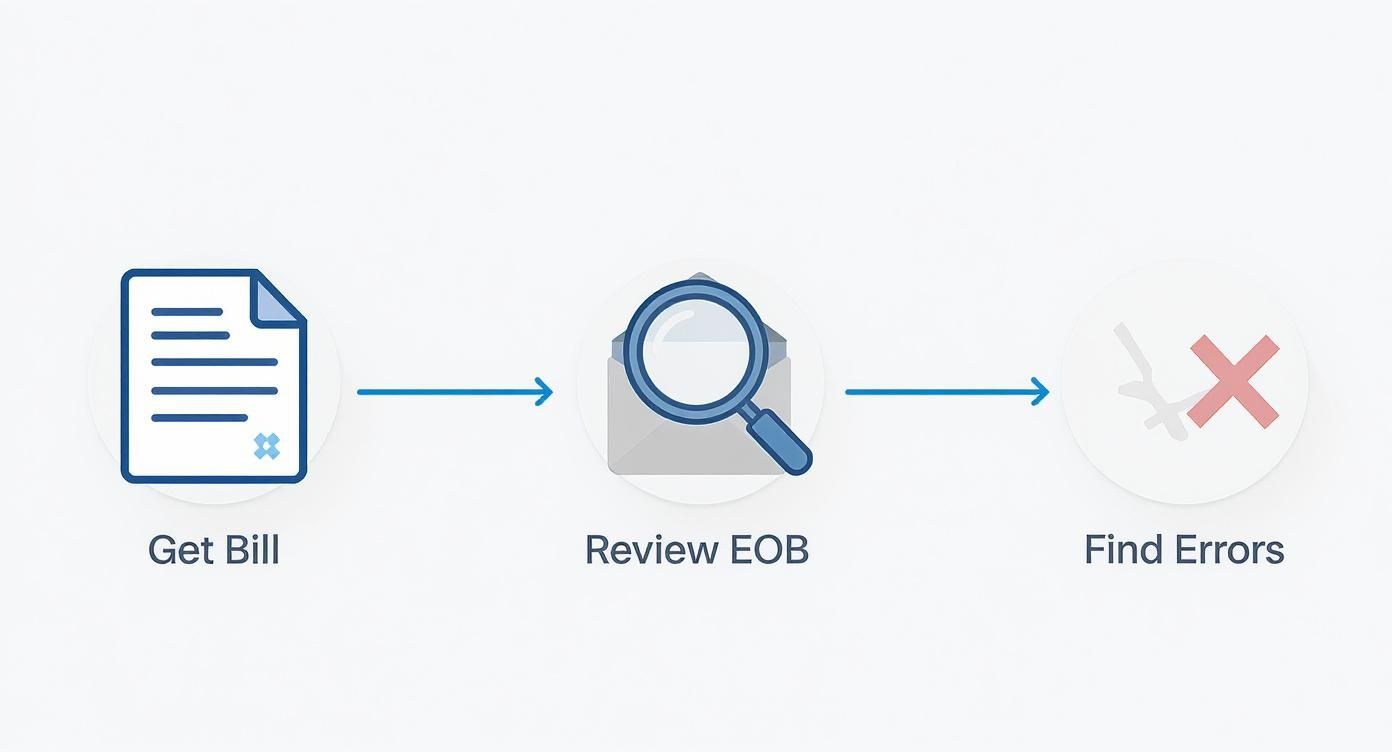The medical bill on your desk is not a final demand. It is an opening offer in a sophisticated negotiation.
Successfully negotiating a medical bill is not only possible, it is a prudent financial strategy. The process begins with a meticulous, line-by-line review of an itemized statement from the healthcare provider. Your leverage is derived from identifying billing inaccuracies, comparing charges against your insurer's approved amounts, and articulating your case to the billing department with precision and data. Success is a function of diligent preparation and professional persistence.
Your Foundational Strategy for Medical Bills
When a substantial medical bill arrives, the natural inclination can be to feel pressured. However, your most effective strategy is established long before you engage with the billing department. It begins with constructing an unassailable foundation of accuracy and information. This preparatory due diligence allows you to negotiate from a position of undeniable strength.
Your first action must be to request a fully itemized bill. A summary statement is insufficient; it obscures the very details where costly errors are frequently found. Once you have this detailed statement, you must cross-reference every line item against the Explanation of Benefits (EOB) provided by your insurer. This is the critical step where common—and often significant—mistakes are exposed.
This methodical process is how you build your leverage. Obtain the bill, verify it against your EOB, and identify all discrepancies before taking any further action.

This systematic review is your single most powerful tool for uncovering weaknesses in their invoicing that you can leverage in a negotiation.
Scrutinize Every Charge and Code
This is where successful negotiations are conceived. You must identify inconsistencies, regardless of their apparent magnitude. In my experience, errors typically fall into several common categories:
- Duplicate Charges: Services or supplies for which you have been billed more than once.
- Incorrect Billing Codes: A significant issue. A procedure may be "upcoded" to a similar but more expensive service.
- Phantom Services: Charges for tests, consultations, or treatments that you never received.
- Unbundled Charges: Billing for services separately that ought to be grouped under a single, more economical package code.
To facilitate this review, I have developed a concise checklist. Before contacting the provider, audit your itemized bill using this framework.
Initial Bill Review Checklist
This table summarizes the critical items to verify on your itemized medical bill. Uncovering just one of these errors provides a powerful entry point for your discussion with the billing department.
| Checklist Item | What to Look For | Action If Incorrect |
|---|---|---|
| Personal Information | Your name, address, and policy number. | Call to correct immediately; inaccuracies can trigger claim denials. |
| Dates of Service | Do the dates align with your hospital stay or appointment? | Highlight any discrepancies to dispute associated charges. |
| Duplicate Charges | Is any service, medication, or supply listed multiple times? | Mark all duplicates. This is a common and easily substantiated error. |
| Billing Codes | Do the CPT codes accurately reflect the services you received? | Research unfamiliar codes; question any that appear inconsistent. |
| Pharmacy Charges | Were you charged for medications you brought from home? | You should not be charged for your personal medication. Dispute this. |
| Operating Room Time | Is the time billed accurate? Check your records. | An additional 30 minutes can represent thousands of dollars. Verify the exact duration. |
By systematically verifying these items, you transition from a patient to an informed principal who is simply validating the accuracy of a service invoice.
A crucial component of your strategy is maintaining a crystal-clear understanding of your medical history and the exact services rendered. Organizing this information is paramount, and there are excellent tools available for building a powerful medical chronology template. Such documentation makes your arguments nearly irrefutable.
A significant percentage of medical bills in the U.S. contain errors. While precise figures vary, numerous analyses suggest error rates are substantial, making a personal audit an essential financial step for any individual.
This diligence is more important than ever as healthcare costs continue to escalate. For 2024, PricewaterhouseCoopers projected a 7.0% medical cost trend, a notable increase from the prior year. Scrutinizing every charge is one of the few direct measures available to counteract these rising expenditures.
When you treat the bill as a draft, not a decree, you fundamentally shift the dynamic. You are no longer a patient passively accepting a charge; you are a prepared principal verifying accuracy and value. This mindset is the bedrock of any successful medical bill negotiation.
Mastering the Art of Negotiation
Once you have meticulously reviewed the itemized bill and had all inaccuracies corrected, the substantive work begins: negotiation. This is where you move beyond rectifying errors and engage in financial strategy. It is a skill that can yield surprising reductions, even on the most intimidating medical invoices. Your preparatory work is your leverage. Now, it is time to deploy it.
The key is to approach the billing department as a pragmatic business partner, not an adversary. You are both seeking a reasonable resolution. A calm, professional, and persistent demeanor will achieve far more than emotional demands.

Researching the Fair Market Price
You cannot enter a negotiation merely wishing for a lower price. You must anchor your request in solid data. Before you contemplate making a call, you must ascertain the fair market value for the services you received.
It is an industry reality that hospitals and clinics maintain multiple price lists. The figure on your bill is rarely the lowest amount they will accept.
Tools such as the Healthcare Bluebook or FAIR Health Consumer are invaluable resources. They aggregate data on what insurance companies actually reimburse for specific procedures in your geographic area, which is often dramatically lower than the "list price" charged to individuals. This information is pure gold.
Armed with this data, your conversation is transformed. It is no longer, "This bill is too high." Instead, it becomes, "I am prepared to pay the fair market rate for this service, which industry data indicates is closer to X amount."
Scripting Your Conversation
When you call the billing department, your language must be precise, confident, and business-like. Dispense with emotional appeals and focus on a clear proposal. The most effective tactic is to frame your offer as mutually beneficial—they receive immediate payment and avoid the administrative costs of sending your account to collections.
Here are several lines that have proven effective:
- The Prompt-Pay Offer: "I have reviewed my itemized bill and am prepared to settle my account in full today. Given the administrative savings this represents, I would like to discuss a prompt-pay discount."
- The Market-Rate Justification: "My research indicates the typical reimbursement for CPT code [insert code here] in this region is approximately [insert fair market price]. I am willing to remit that amount now to resolve this matter."
- The Structured Payment Plan: If a lump-sum payment is not optimal, do not hesitate to propose an interest-free payment plan. For a provider, a structured plan is almost always preferable to selling your debt to a collection agency for a fraction of its value.
The most effective negotiations are collaborative. You are not making demands; you are offering a solution that benefits both parties. You resolve your debt, and they secure immediate payment without the complexities of collections. This simple shift in mindset turns a potential conflict into a straightforward business transaction.
Of course, a comprehensive understanding of your insurance policy is non-negotiable. It dictates your ultimate financial responsibility. Grasping the distinction between your policy’s excesses and deductibles is particularly crucial and will substantially strengthen your position.
Ultimately, negotiating a medical bill is about employing research, professionalism, and intelligent communication to convert a daunting liability into a manageable, equitable expense.
Leveraging Professional Medical Bill Advocates
For a particularly high-value or convoluted medical bill, attempting to manage the negotiation yourself may not be the most efficient use of your time. This is precisely when you should consider engaging a professional.
An entire industry of medical bill negotiation services and specialized advocates exists to manage these complex matters on your behalf. Frequently, the savings they secure for you will substantially exceed their fees.

Hiring an expert is not an admission of defeat; it is a calculated business decision. Your time is a valuable asset, and the hours required to untangle complex billing codes, liaise with providers, and navigate insurance appeals can be immense. An advocate manages the entire process, freeing you to focus on your recovery and other professional responsibilities.
This specialized field is expanding for a reason. The medical billing system has become so opaque that it has created significant demand for expert navigators. In fact, the global market for medical billing outsourcing was valued at USD 14.1 billion in 2023 and is projected to grow significantly. You can review more data on this expanding market from Archive Market Research. This growth merely underscores the value these professionals provide within a flawed system.
Identifying the Right Professional
When seeking assistance, you will encounter several types of experts. Understanding their distinct roles is key to selecting the appropriate partner for your specific situation.
- Medical Billing Advocates: These are specialists who audit bills for errors, dispute incorrect charges, and negotiate directly with the provider's billing department. They are your primary resource for correcting coding mistakes and securing direct discounts.
- Claims Assistance Professionals: These experts focus on the insurance side of the equation. They manage claims submissions, appeal denials, and work to ensure you receive the maximum benefit your policy provides.
- Specialized Attorneys: If your situation involves a personal injury, liens on a settlement, or the threat of legal action, you require an attorney with experience in healthcare law. This is non-negotiable.
The most common compensation model for these professionals is a contingency fee. An advocate will typically charge a percentage—often between 15% and 35%—of the total amount they save you. This structure aligns their interests directly with yours; they are compensated only if they successfully reduce your bill.
Vetting Your Advocate
Before engaging anyone, you must conduct your due diligence. You are entrusting them with sensitive financial and medical information, making a thorough vetting process critical.
When interviewing potential advocates, be direct. You need to assess their expertise and determine if they are a suitable fit for your case.
Inquire about their specific experience with situations analogous to yours. Request references from past clients. Most importantly, demand a clear, written agreement that details their fee structure and the precise scope of services they will provide. A reputable professional will anticipate this level of scrutiny and will furnish transparent answers, giving you the confidence required to proceed. This diligence ensures you partner with an expert capable of delivering tangible financial results.
Advanced Strategies for Expatriates
Navigating medical bills is already a complex undertaking. When care crosses international borders, the complexity multiplies. As an expatriate, you are engaged in an entirely different strategic environment.
You face a unique set of challenges: currency fluctuations that can inflate costs, unfamiliar billing codes that are difficult to verify, and a mosaic of healthcare regulations that can present unforeseen obstacles. This requires a specialized strategy beyond standard negotiation tactics.
Success in this arena hinges on being proactive. Before committing to a planned procedure, initiate a discussion about pre-payment. International private hospitals often value the certainty of an upfront payment. In return, they may offer a significant discount, and both parties can bypass the complexities of cross-border insurance claims.

This simple action places you in a position of control from the outset. You are not reacting to an unexpected bill weeks later; you are establishing favorable terms from the beginning.
Mastering Cross-Border Billing Nuances
When an itemized bill from an international provider arrives, it can be perplexing. Do not expect the standardized CPT codes used in the U.S. Instead, you will likely encounter local systems that are nearly impossible to verify through standard online resources.
Furthermore, the currency conversion rate applied by the hospital may not match the interbank rate, subtly inflating the final total. It is a nuanced but common issue.
You must demand absolute clarity on two points:
- Billing System: Disregard the codes. Request a simple, plain-language description of every service rendered.
- Currency Conversion: Insist on seeing the original bill in the local currency and the converted amount. If the exchange rate appears unfavorable, challenge it.
I cannot overstate the importance of documenting everything. Every email, every phone call, every contact person. A clear paper trail is your most potent weapon should a dispute arise later regarding agreed-upon terms.
Be vigilant for international "balance billing." This occurs when a provider seeks to collect the difference between their full charge and what your insurer paid. This can be an aggressive practice. Your only effective defense is a thorough understanding of your policy's out-of-network provisions.
A deep understanding of your insurance policy is not merely advisable—it is essential. Take the time to review the fine print. Our guide on how to understand your expat medical insurance policy terms is an excellent starting point for building that critical knowledge.
The Power of Local Knowledge and Global Options
If you are contending with a significant language barrier or a healthcare system that feels like a bureaucratic labyrinth, hiring a local advocate or translator is not an expense—it is a strategic investment. They can decipher medical jargon and navigate the cultural nuances of negotiation far more effectively than anyone can from a distance.
On a broader scale, expatriates and global citizens should always be aware of how to access more affordable care worldwide. This can dramatically reduce your costs before they are incurred. For instance, many individuals are exploring affordable healthcare options internationally for planned procedures.
By blending sharp negotiation skills with intelligent, proactive choices, you can assume firm control of your healthcare expenditures, regardless of where in the world you require care.
Maximizing Your Health Insurance Benefits
Consider your health insurance the primary financial shield protecting your wealth from unforeseen medical events. A common error, however, is to view it as a passive safety net. To truly safeguard your assets, you must actively manage your coverage, treating it with the same diligence as any other critical financial instrument.
This entails partnering with your insurer long before a bill ever materializes. It is about understanding the deep mechanics of your policy—beyond just premiums and deductibles—to know precisely how claims are approved or denied. This shift in mindset transforms your relationship with your insurer from adversarial to collaborative, which is essential when dealing with complex or high-value healthcare.
Navigating the Formal Appeals Process
When a claim is denied, the initial "no" from your insurer is rarely the final word. It is merely the beginning of a formal appeals process, a structured system you are entitled to utilize. A denial is not a judgment on your health; it is often a procedural matter—perhaps a clerical error, a question of medical necessity, or a missing pre-authorization.
Your first step? Demand a formal, written explanation for the denial. This document is invaluable. It will cite the specific reason and policy exclusion used, providing the exact information needed to construct your counter-argument. A well-crafted appeal, particularly one supported by a letter from your physician explaining why a procedure was medically necessary, has a surprisingly high probability of success.
A denial letter is not the end of the road; it is a map indicating exactly what you need to address. Below is a concise guide to common denial codes and how to respond.
Common Insurance Claim Denial Codes and Next Steps
| Denial Reason | What It Means | Recommended Action |
|---|---|---|
| Service Not Covered | The procedure is not a benefit under your specific plan. | Review your policy's "Schedule of Benefits" and "Exclusions." If you believe it should be covered, file a formal appeal with supporting documentation from your physician. |
| Lack of Medical Necessity | The insurer determined the service was not medically required based on the information provided. | This is a very common and highly appealable denial. Work with your doctor to write a detailed letter of medical necessity explaining your diagnosis, the treatment's importance, and potential negative outcomes without it. |
| Missing Pre-Authorization | Your insurer requires prior approval for this service, which was not obtained. | Contact the insurer immediately. This can sometimes be rectified retroactively, especially in urgent situations. If not, appeal and explain the circumstances. |
| Out-of-Network Provider | You received care from a doctor or facility not in your plan's approved network. | Check your plan details. If you have out-of-network benefits, appeal to have the claim reprocessed at that rate. If it was an emergency, you may appeal for an in-network exception. |
| Coding Error | The provider used an incorrect billing code (CPT or ICD-10). | Contact your provider's billing office and ask them to review the claim for coding accuracy. If an error is found, they should resubmit the claim with the correct code. |
Remember, these codes are merely the starting point for a professional dialogue. Do not be intimidated; use them to build your case.
The Strategic Value of a Dedicated Case Manager
If you are managing a complex or chronic condition involving multiple specialists, you should not be navigating the system alone. Most premier insurance carriers offer the services of a dedicated case manager upon request. Consider this individual your invaluable internal advocate.
A competent case manager can:
- Coordinate care across different physicians and facilities.
- Proactively manage pre-authorizations for upcoming treatments.
- Assist in identifying top-tier in-network providers to avoid out-of-network costs.
- Serve as your single, consistent point of contact, eliminating the need to repeatedly explain your situation.
Engaging a case manager early streamlines the entire process, drastically reducing administrative burdens and the potential for billing errors. It is a premium service for which you are already paying through your premiums—you simply need to take the initiative and request it.
The Critical Importance of Pre-Authorization
Failing to secure pre-authorization for a scheduled procedure is perhaps the most common—and costly—mistake. Pre-authorization is the process wherein your insurer confirms a service is medically necessary before you receive it. Neglecting this step is one of the simplest ways for an insurer to deny a claim, leaving you responsible for the entire bill.
Securing pre-authorization is non-negotiable. It is the contractual checkpoint that confirms your insurer's financial responsibility for a service. Treat it as a mandatory step for any non-emergency procedure.
With the cost of healthcare on a continual incline, you must extract maximum value from your benefits. In the U.S., average family health insurance premiums approached $24,000 in 2023, a significant increase driven by the rising costs of specialized care and prescription drugs. You can see a detailed outlook on these rising healthcare costs and their impact.
When you are investing that much in your coverage, ensuring every claim is properly processed and pre-approved is not just good practice; it is fundamental financial diligence. This proactive stance is the core of any effective strategy for how to negotiate medical bills.
Your Questions Answered: Navigating Medical Bill Negotiations
Even the most robust strategy can encounter obstacles. When faced with a six-figure medical bill, questions are inevitable. Let's address the most common inquiries I receive from clients, so you can proceed with confidence.
How Long Does This Process Typically Take?
There is no single timeline—it is entirely variable. A simple, unambiguous billing error might be resolved in a few weeks with persistent communication.
However, if you are addressing a more complex situation—involving multiple providers, a formal insurance appeal, or a substantial sum—be prepared for a more extended engagement. The process could easily span several months. Patience and persistence are your greatest assets. The key is to maintain pressure with consistent, documented follow-ups. Never allow weeks to pass without requesting a status update.
Can a Provider Refuse to Negotiate?
Legally, yes. A healthcare provider is not obligated to negotiate a price after a service has been rendered.
In practice, however, it is almost always in their financial interest to be flexible. Consider their alternative: assigning your account to a collections agency. This is a protracted, costly process for them, and they are aware they will ultimately recover only a small fraction of the original amount.
Most billing departments are managed by pragmatists. When you present a reasonable, data-supported offer—particularly one accompanied by the promise of prompt payment—they are almost always willing to engage. Your leverage lies in offering them a better, faster financial outcome than the collections alternative.
The most important principle to remember is this: the initial bill is an opening offer, not a final command. Every provider has built-in profit margins and negotiating flexibility. Treat this as the business transaction it is, and you will place yourself in a much stronger position.
What Happens If a Bill Goes to Collections?
Should your bill be transferred to a collection agency, your strategy must adapt. The positive aspect is that the agency likely acquired your debt for a fraction of its face value, meaning they have considerable flexibility to settle.
The negative aspect is that this is a situation to be avoided, as it can have a detrimental impact on your credit report. If it occurs, open a line of communication with the agency immediately. Make a fair offer, secure all agreements in writing, and never provide direct access to your bank accounts. All payments should be remitted via check to create an unimpeachable paper trail.
Is There a Best Time to Negotiate?
Absolutely. The optimal window is immediately after you receive the itemized bill and have completed your audit for errors.
At this stage, the account is still active within the provider's system. The internal billing department possesses the greatest authority to make adjustments before the account is "aged" and flagged for outsourcing.
Delay only introduces complications. It can even lead to the account being sent to collections prematurely. Acting swiftly demonstrates that you are a responsible and engaged principal seeking a fair resolution, which typically makes the provider's billing team far more cooperative.
At Riviera Expat, we believe managing your health should not compromise your financial peace of mind. We design sophisticated international private medical insurance solutions for discerning professionals who operate globally. To gain clarity and control over your healthcare coverage, explore your options with us.

